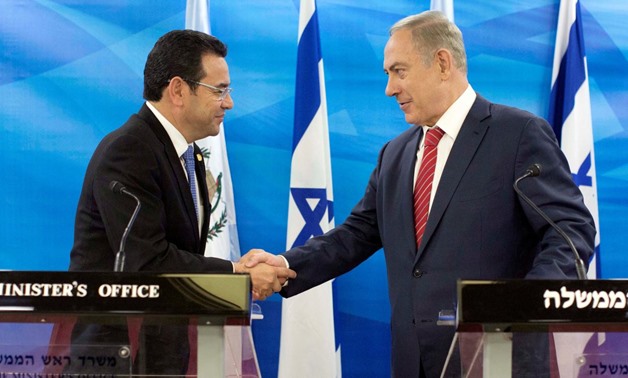
Guatemalan President Jimmy Morales and Israeli Prime Minister Benjamin Netanyahu shake hands as they deliver statements to the media during their meeting in Jerusalem November 29, 2016. REUTERS/Abir Sultan
28 December 2017: Guatemala's recognition of Jerusalem as the Israeli capital cleaves President Jimmy Morales closer to the United States at a time his stock has fallen at home due to corruption allegations raised by U.N.-backed investigators.
Defying overwhelming international rejection of President Donald Trump's decision to move his embassy to Jerusalem, Guatemala and Honduras were the only nations in the Americas to back him in a U.N. General Assembly vote last week.
Increasingly isolated at home, Morales won friends in Washington by aligning himself with Trump, although he runs the risk of backlash from Arab countries which import the costly spice cardamom from Guatemala.
Morales on Christmas Eve said he would follow Trump in moving Guatemala's embassy from Tel Aviv to Jerusalem.
"This is a pretty low-cost way for Morales to make sure the Trump administration is on his side," said Michael Shifter, head of the Inter-American Dialogue, a Washington-based think tank.
Morales is no stranger to international controversy.
In August, the former TV comedian came under fire from the United Nations, the European Union and the U.S. ambassador in Guatemala for attempting to expel a U.N.-backed prosecutor seeking to put him on trial for alleged corruption.
The investigation into allegations of illicit campaign financing - which followed separate graft probes into members of the president's family - had threatened to condemn Morales to impeachment.
Morales escaped that fate but he had to back down over a bid to eject the head of the U.N.-backed International Commission Against Impunity in Guatemala, and his authority has been seriously undermined.
Morales, an evangelical Christian, says the Israel policy is a principled stand in the tradition of Guatemala's longstanding support of Israel.
"Even though there were only nine of us in the whole world who backed (Trump's position) we're totally sure this is the right path," Morales said of the U.N. vote. Eight other nations opposed the resolution condemning the United States for recognizing Jerusalem as Israel's capital and 128 voted for it.
The status of Jerusalem is one of the thorniest obstacles to any Israeli-Palestinian peace deal. Palestinians want East Jerusalem as the capital of their own state.
GUATEMALAN REALPOLITIK
Backing Trump was also an exercise in realpolitik for Morales.
Trump threatened to cut aid to countries backing the U.N. resolution. Few in the Americas rely more on U.S. support than Guatemala, Honduras and El Salvador, which did not vote.
Pending U.S. approval, Guatemala is set to receive some $209 million from the Alliance for Prosperity Plan in the Northern Triangle, a U.S.-funded program, according to the government.
Guatemala also received almost $100 million from the United States Agency for International Development last year, and over $75 million in security aid between 2012 and 2015, according to the Security Assistance Monitor database.
The local economy benefits from money sent home by hundreds of thousands of Guatemalans in the United States, many of whom are unlawful immigrants that Trump has threatened to send home.
Remittances are this year set to top $8 billion, equivalent to roughly three-quarters of the Guatemalan budget.
Were those flows to dry up, it would aggravate discontent at Morales.
"These acts of good faith and support for Donald Trump's government could eventually turn into opportunities for political stability that right now aren't there," said Ricardo Barrero, political coordinator at the Guatemala City-based Central American Institute of Political Studies.
Israel has provided important training for Guatemala's military.
But Guatemala also has other interests in the Middle East, not least demand from Arab states for cardamom, of which it is the world's biggest producer.
Former Guatemalan vice president Eduardo Stein recalled that in the mid-1990s, Guatemala also said it would move its embassy to Jerusalem - before backing off amid threats from Arab nations not to import cardamom, which is used in Arabic coffee.
"It's likely to happen again," said Stein, referring to possible cardamom curbs.


Comments
Leave a Comment